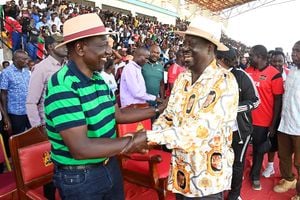
President William Ruto and ODM leader Raila Odinga in Uganda in February 2024.
Several key events and personalities are expected to shake up the political landscape as the Kenya Kwanza administration enters a decisive year that could shape President Ruto’s tumultuous first term ahead of the 2027 elections.
All eyes will be on how President Ruto will navigate 2025 as dissent among young people and political opponents led by his former deputy Rigathi Gachagua intensifies. This comes even as the President continues to reach out across the aisle to strengthen the so-called broad-based government and seek political stability.
Nation.Africa has sampled at least 10 events that will significantly impact the country's political wave.
Ruto and the broad-based government
During his New Year’s speech delivered from Kisii State Lodge on December 31, President Ruto pledged to continue “the broad-based, bipartisan national conversation we are having with leaders from various political formations”.
With allies of former President Uhuru Kenyatta waiting to join a Cabinet that now includes former Prime Minister Raila Odinga’s camp, 2025 is the year that will test how Dr Ruto handles the competing interests in “the team of rivals” to avoid a fallout.
Although the vetting of Mr Kenyatta's allies into the cabinet is still pending in Parliament, they are expected to not only provide political stability but also lead a fightback in the Mt Kenya region where President Ruto is losing ground after falling out with Mr Gachagua.
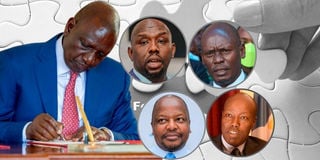
President William Ruto (left) Top row- New Interior CS Kipchumba Murkomen, Cabinet nominees William Kabogo (ICT), Mutahi Kagwe (Agriculture) and Lee Njiru (Trade).
Analysts have said it will be no easy task for former Health Cabinet Secretary Mutahi Kagwe (Agriculture ministry nominee), former governors William Kabogo (ICT ministry nominee) and Lee Kinyanjui (Trade ministry nominee).
In what seems to be a deliberate move, the three are expected to join a list of other politicians in the Cabinet, should their nominations be approved. Others include John Mbadi (National Treasury), Opiyo Wandayi (Energy), Hassan Joho (Blue Economy), Wycliffe Oparanya (Cooperatives and MSMEs), Kipchumba Murkomen (Interior), Alfred Mutua (Labour), Aden Duale (Environment) and Alice Wahome (Lands)
Appointment of new Principal Secretaries
The much-awaited shake-up of Principal Secretaries will have a significant effect on the Ruto administration.
The planned changes are likely to bring in more allies of Mr Odinga and Mr Kenyatta, a move that will mean some of the PSs currently serving will be sacked.
Earlier reports had indicated that the changes of the accounting officers will see a majority of allies of former Deputy President Rigathi Gachagua shown the door to accommodate allies of the new political friends.
The Public Service Commission (PSC) in November advertised for the position of the PSs, setting December 4 as the deadline for those willing to be considered for the posts. The process of bringing in new faces is expected to be completed early in the year.
African Union elections and Raila’s political future
The election of the chairperson of the African Union Commission (AUC) in February is also a major event that will have major ramifications on local politics.
Should veteran opposition leader Raila Odinga bag victory, then Kenya’s political landscape will be interesting to watch without him for the first time in decades after he vowed to keep off local politics and even picked Kisumu Governor Anyang’ Nyong’o as the interim leader of ODM.
Mr Odinga’s victory in the coveted position will mean that the man who has had a major impact on the country’s politics for nearly four decades now will not have limited direct participation in the 2027 General Elections unless he resigns from his position.
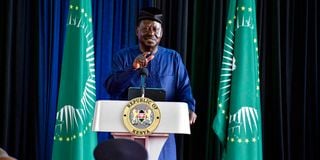
Kenya's Raila Odinga makes his remarks during the launch of his bid for the African Union Commission Chairmanship candidate at State House, Nairobi on August 27, 2024.
Political pundits say Mr Odinga’s victory will be a major political relief to President Ruto who will be seeking his second term in 2027, as the opposition leader with his massive supporters across the country poses a major threat if he jumps ship and gets involved in the 2027 elections—as a kingmaker or a candidate.
Should Mr Odinga fail to clinch the AUC post, this will mean that he will be back to local politics to back or oppose Dr Ruto.
The absence of Mr Odinga in local politics will also pose a major headache to other elective seats, especially in his Nyanza backyard where some leaders have been riding on his name and support to win.
Gen Z wave and emergence of new presidential hopefuls
The pro-reforms protests that were at their most intense in June and July, have continued to have political repercussions. While the demonstrations have been less potent following brutal police response and abductions, dissent on social media has continued to grow. President Ruto and his closest allies have criticised the tactics used to sustain attacks online, calling on parents to “guide” their children to avoid fraying the country’s moral fabric.
The amorphous youth-led movement that typified itself as “partyless” and “tribeless”, has also brought forth people with presidential ambitions— some of whom have divided opinion—while others have “defected” to support the Ruto administration.
Activist Morara Kebaso has formed the Injection of National Justice, Economic, and Civic Transformation (INJECT) Party as a political vehicle he hopes young people will use in 2027.
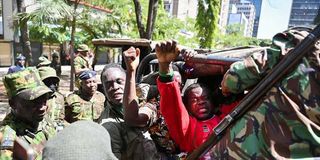
Busia Senator Okiya Omtatah reacts after riot police officers detained him among other protesters demonstrating against what they say is a wave of unexplained abductions of government critics, along the Aga Khan walk in downtown Nairobi, Kenya December 30, 2024.
Busia Senator Okiya Omtatah who has also been at the forefront of the protests, including the Monday anti-abduction demonstrations, has also formed a committee to assess his candidacy for the 2027 presidential election. He is among leaders seeking to attract the youth vote.
This new wave—online and offline—is expected to provide unique challenges to President Ruto and his allies who are used to facing traditional political opponents.
Which way Gachagua?
Impeached Deputy President Rigathi Gachagua will be a man crossing his fingers this year as the petition challenging his impeachment is set to be mentioned on January 23
So significant will be the outcome of this case to Mr Gachagua as a win will lift the impeachment tag that is currently a political burden that bars him from running for office.

Former deputy president Rigathi Gachagua during a press interview at the home of former Kakamega senator Cleophas Malala in Makunga, Navakholo in Kakamega County on December 29, 2024.
A win for Mr Gachagua will also mean that he will be able to run for political office, get all his benefits as the Deputy President, and get back his security fully paid by the government.
Nonetheless, Mr Gachagua is expected to provide “political direction” to his Mt Kenya base that he hopes to consolidate as he seeks coalition partners to kick out President Ruto.
Reconstitution of Electoral Commission
The discussion on the reconstitution of the Independent Electoral Boundaries Commission (IEBC) will continue to be a major topic in the New Year.
Already various stakeholders have criticised the government over the delayed reconstitution of the electoral body with the government defending itself, citing a court case over the membership of the selection panel as the major impediment to the process.

An Independent Electoral and Boundaries Commission (IEBC) official inside a polling station in Kiambu County before polls open during Kenya's general election on August 9, 2022.
Some players are already reading mischief in the delay, claiming it is deliberate in order to prevent the angry voters from recalling their MPs whom they feel have failed to discharge their mandate.
The delay has also denied some Kenyans their democratic right to be represented in Parliament and various county assemblies through by-elections despite the law requiring that such a position should be filled within 90 days.
IEBC is a major player in elections and is expected to start voter registration and planning for the 2027 polls.
Kindiki’s delicate balancing act
Eyes will also be on the new Deputy President Kithure Kindiki on how he will navigate the year as politics of Mt Kenya East and West will continue to play out after Mr Gachagua’s impeachment.

Deputy President Kithure Kindiki addressing journalists at Harambee House Annex in Nairobi on November 7, 2024.
Prof Kindiki will have the task of performing his duties, defending the government, assisting President Ruto in fulfilling his election pledges, and navigating the forthcoming General elections.
There are already reports that key figures from Meru are likely to be given influential government positions as part of the wider scheme by Dr Ruto to consolidate Mt Kenya East just in case Central Kenya slips away.
Kalonzo Musyoka: Will he stand up as the voice of opposition?
Wiper leader Kalonzo Musyoka will be a man to watch this year with a possible alliance looming with former Deputy President Rigathi Gachagua.
In a recent visit to the Ukambani region, Mr Gachagua told Mr Musyoka to shore up the number of registered voters in the region to 3 million and then look for him.
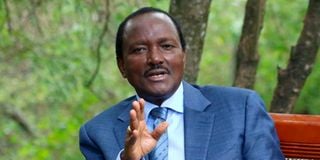
Wiper leader Kalonzo Musyoka.
In his New Year message Mr Musyoka delivered at the SKM command centre on Tuesday, Mr Musyoka criticised the government for failing to adhere to the rule of law and for the violence meted out on protesters and government critics in the year 2024.
Whether Mr Musyoka will continue to stand up as the voice of opposition after the departure of Mr Odinga will be seen this year. His moves will also determine the fate of the Azimio coalition after Mr Odinga’s ODM, the biggest party in the political formation, gravitated towards the Ruto administration.
Eyes on Wetang’ula and his Ford Kenya party
Speaker of the National Assembly Moses Wetang’ula will be a man under pressure to fold his Ford Kenya Party just like Musalia Mudavadi did to Amani National Congress.
Although Mr Wetang’ula has already resisted such a move, there is still a concerted effort in the government to ensure the former Bungoma senator folds the party ahead of the 2027 General Elections. President Ruto’s goal has been to form a super party.
Navigating Finance Bill 2025/2026
After suffering a major setback following the rejection of Finance Bill 2024/2025 that triggered demonstrations by Gen Z, eyes will be on the government this year on how it will craft its way around the new tax plan without attracting the wrath of Kenyans.

